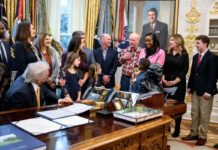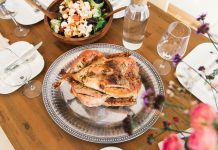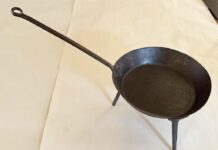WASHINGTON — As millions of Americans welcome summer, the U. S. Department of Agriculture reminds people to keep it safe: follow the latest Centers for Disease Control and Prevention guidance for COVID-19, and remember your food safety practices.
Rates of foodborne illness tend to increase during the summer months because germs grow faster in warmer, more humid weather. People also cook and eat outside, making shortcuts to food safety tempting.
Don’t let foodborne illness ruin the cookout. Follow food safety guidelines, like washing your hands, thoroughly cooking your food and checking food temperature with a thermometer. For those who choose to celebrate outdoors, USDA has some advice.
Food thermometer
Many people may be grilling on their own for the first time. One important lesson for first-time grillers is to remember that color is never a reliable indicator of safety and doneness.
Use a food thermometer to ensure safe internal temperatures. Cook poultry to 165 degrees Fahrenheit. Cook beef, pork, lamb and veal steaks, chops and roasts to 145 degrees. For safety and quality, allow meat to rest for at least three minutes before carving or consuming. Cook ground beef, pork, lamb and veal to 160 degrees. Cook egg dishes to 160 degrees. Cook fish to 145 degrees.
Don’t have a food thermometer? Call the USDA Meat and Poultry Hotline at 1-888-674-6854.
Although frozen products may appear to be pre-cooked or browned, they should be handled and prepared no differently than raw products and must be grilled to appropriate temperatures. Frozen products may be labeled with phrases such as cook and serve, ready to cook and oven ready to indicate they must be cooked.
Thoroughly cook meat. Many grill masters enjoy using already tenderized meats that have marinades added to get the most flavor out of their meal. However, mechanically tenderized beef, including cuts that are prepackaged in marinades, must be cooked thoroughly to ensure food safety.
If the outside of the meat contains bacteria, it will be transferred to the inside of the meat during mechanical tenderization, requiring it to be cooked to kill the germs. The best way to ensure a worry-free barbecue is to thoroughly cook mechanically tenderized meat. Use your food thermometer and follow USDA’s recommendations for safe internal temperatures.
One-hour rule
When the temperature outside rises above 90 degrees, perishable food, such as meat and poultry, dips and cold salads or cut fruits and vegetables are only safe to sit out on the table for one hour. After one hour, harmful bacteria, which can cause foodborne illness, may start to grow. To prevent this, keep cold foods cold and hot foods hot.
According to a recent USDA survey, nearly 85% of participants said they don’t keep cold foods on ice when they serve them. Keep cold foods at an internal temperature of 40 degrees or below by keeping food on ice or refrigerated until ready to serve.
In the same survey, 66% of participants indicated they did not keep their cooked foods, like burgers and hot dogs, warm after cooking. Hot perishable foods should be kept warm (above 140 degrees) until they are eaten, or refrigerated within one hour.
Know your environment
At your outside barbecue, make sure to have hand sanitizer or moist towelettes available to keep your hands clean before, during and after food preparation. Use warm, soapy water to wash hands for at least 20 seconds before and after handling food.
Use hand sanitizer that contains at least 60% alcohol. Use alcohol-based moist towelettes to sanitize cutting boards or utensils.
For any summer food safety questions, call 888-674-6854 or chat live at ask.usda.gov, from 10 a.m. to 6 p.m. Eastern Time, Monday through Friday.
















